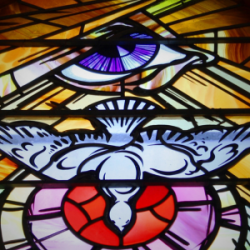We are a nation of immigrants, a nation of multiple faiths, and we are richer, happier, and healthier when we acknowledge that. Some years ago, Martin Luther King, Jr., and a multi-racial, multi-faith group convened on the steps of the Lincoln Memorial in Washington, D.C. to gave us a vision of hope, faith, and reconciliation.
Unfortunately, that's not what happened when Glenn Beck brought his "Reclaiming Honor" show to the nation's capital recently. While there was indeed attention paid to faith and to hope of a kind, reconciliation, I fear, was left wandering orphaned in the cold.
Mr. Beck Goes to Washington
I do not like Glenn Beck. I confess my bias, so that I can try from here on to be even-handed. Although I know that he intentionally works as a combative media personality like Ann Coulter, like Rush Limbaugh, like Keith Olbermann, and thus antagonism and conflict are at the heart of his appeal, in general I am these days looking for uniters, not dividers. I am rooting for people in the public eye who have a bit of humility, who are not absolutely convinced that they are absolutely right and their opponents absolutely wrong. To paraphrase Reinhold Niebuhr, I am looking for those who can be open to the truth in their opponent's error, and the error in their own truth.
Beck believes in individual initiative, and his own personal story convinces him that everyone should be able to make it in America if they work hard enough, save enough, work smart enough. I know that these are conservative creeds, and acknowledge the possibility of truth here, for I too believe in hard work and individual responsibility. I am financially responsible for myself and my two boys, I don't ask the government for hand-outs, and I was raised to think that to ask for help was a sign of weakness.
But despite all the reversals and hard times I have overcome, with God's help, I know that I began better off -- and continue to be better off -- than a huge number of people in our society. My family took education seriously, so I earned four college degrees. I have held the same job for over two decades, so I have health insurance and dental insurance, and a retirement account, sadly depleted as it is just now.
Thus, for me to imagine that my case should be illustrative for people who have lost their jobs in a one-industry town, for people whose homes are being foreclosed, for those without health insurance facing catastrophic illness, for all those Americans who are drowning while I manage to tread water is, at best, unfair.
Beck's attacks on those Christians like Martin Luther King, Jr., (and me) who believe that our faith calls us to work for social justice is a major difference between us. I believe that Christian faith is less about individual salvation than the salvation of the cosmos, inaugurated by Jesus' life, faithful death, and miraculous resurrection. Thus the irony, intended or unintended, of Beck speaking from the same location where Dr. King called for a new attention to justice in American society, one of the most famous markers of that call in American history.
Mr. Beck is entitled to read the Bible using whatever filters he believes are faithful, and, as I was reminded by James Payton's fine new book Getting the Reformation Wrong, disagreement about some details of faith can lead to good things. I am trying hard, as I said, to seek common ground rather than schism, and while I don't know if Beck would extend the same courtesy to me, this disagreement over social justice might not be a deal breaker, the kind of thing worth creating schism over. It might actually force us both to refine and redefine our beliefs.
So I am unwilling to call Mr. Beck an unfaithful person just because we disagree, and I am reminded of Clement of Rome, who advised, "Be contentious and zealous, but only about the things that relate to salvation." I don't know that justice work is required for salvation, whatever that might be, and I have no wish to consign my opponents to hell, whatever that might mean.
Still, an inescapable observation is that thousands of verses in the Bible concern how we treat those who are on the margins -- the poor, the widow, the alien. In the first centuries of the Church, before Christianity became the state religion of Rome and more closely tied to the interests of those in power, the Sermon on the Mount was one of the most-read and preached on of texts, focusing as it does on the blessing God intends for those who seem at first glance to be on the outside of blessing. And as I read the Bible, which I do as both a literary scholar and a trained theologian, the narrative of God moving in the world is a story that trends toward love, toward kindness, toward reconciliation, and toward charity.





